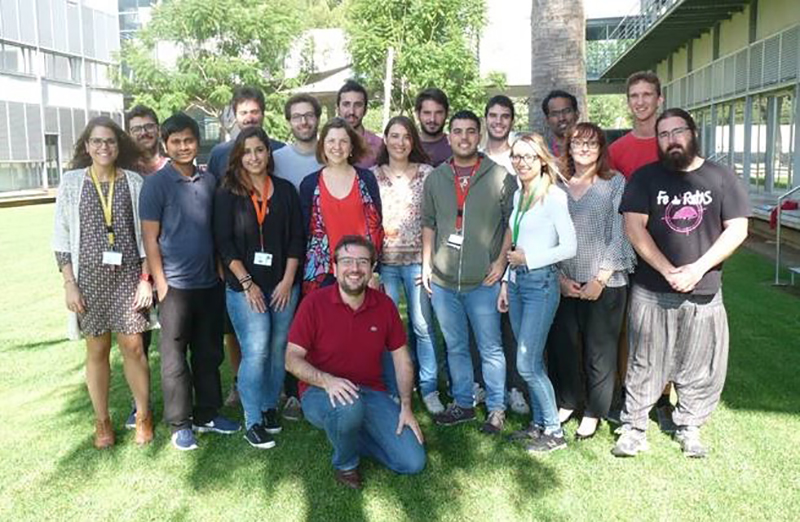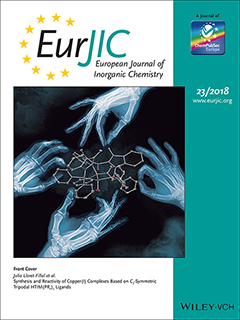Prof. Julio Lloret-Fillol

Group Leader:
Julio Lloret-Fillol, ICREA Professor
Administrative Support:
Cristina Vega (until June) / Beatriz Martin (from July)
Postdoctoral Researchers:
Alicia Casitas (until June) / Noufal Kandoth / Ekaterina Smirnova / Federico Franco / Felix Ungeheuer / Suvendu S. Mondal / Alberto Bucci
PhD Students:
Carla Casadevall / klaudia Micheliszyn / Miguel Claros/ Sergio Fernández / Geyla C. Dubed / Jordi Aragón / Luis Gutiérrez / David Pascual
Visiting Students:
Euth Ortiz (Sept. -Oct.), Felipe Alvarado (June – Aug.), José Martí (25 June – 30 Aug.), Victor Mateos (22 June – 30 Aug.)
Summer Fellows:
Laura Muñoz
Summary
The group of Prof. Lloret-Fillol is inspired by nature to address fundamental issues with great technological potential that remain unresolved. Currently, the group intends to transfer concepts of artificial photosynthesis to organic synthesis, to carry out enderzoic transformations using sunlight as a driving force and to drive the development of new and more environmentally-friendly methodologies for the transformation of organic molecules. In this regard, the group has developed biomimetic catalysts based on abundant metals for the reduction of water and CO2, catalysts that are also highly active in the photocatalytic reduction of organic compounds as well as in the activation of C-X links.

Publications
‘Understanding Light-driven H2 Evolution through the Electronic Tuning of Aminopyridine Cobalt Complexes’
A. Call, F. Franco, N. Kandoth, S. Fernández, M. González-Béjar, J. Pérez-Prieto, J.M. Luis, J. Lloret-Fillo
Chem. Sci. 2018, 9, 2609-2619
‘Design of Zn-, Cu-, and Fe-Coordination Complexes Confined in a Self-Assembled Nanocage’
C. Colomban, V. Martin-Diaconescu, T. Parella, S. Goeb, C. García-Simón, J. Lloret-Fillol, M. Costas, X. Rivas
Inorg. Chem. 2018, 57 (7), 3529-3539
‘Bioinspired Electro-Organocatalytic Material Efficient for Hydrogen Production’
Mas-Balleste, O. González-del Moral, A. Call, F. Franco, A. Moya, J.A. Nieto, M.
Frías, J.L.G. Fierro, M. Costas, J. Lloret-Fillol, J. Alemán
Chem. Eur. J. 2018, 24 (13), 3305-3313
MORE PUBLICATIONS
‘A Highly Active N-heterocyclic Carbene Mn(I) complex for Selective Electrocatalytic CO2 Reduction to CO’
F. Franco, M.F. Pinto, B. Royo, J. Lloret-Fillol
Angew. Chem. Int. Ed. 2018, 57 (17), 4603-4606
‘Spectroscopic and DFT Characterization of a Highly Reactive Nonheme Fe(V)–Oxo Intermediate’
R. Fan, J. Serrano-Plana, W.N. Oloo, A. Draksharapu, E. Delgado-Pinar, A. Company, V. Martin-Diaconescu, M. Borrell, J. Lloret-Fillol, E. García-España, Y. Guo, E.L. Bominaar, L. Que, M. Costas, E. Münck
J. Am. Chem. Soc. 2018, 140 (11), 3916-3928
‘Manganese N‐Heterocyclic Carbene Complexes for Catalytic Reduction of Ketones with Silanes’
M. Pinto, B. Royo, S. Friães, F. Franco, J. Lloret-Fillol
ChemCatChem 2018, 10 (13), 2734-2740
‘Synthesis and Reactivity of Copper(I) Complexes Based on C3‐Symmetric Tripodal HTIM(PR2)3 Ligands’
E. S. Smirnova, F. Acuña‐Parés, E. C. Escudero‐Adán, C. Jelsch, J. Lloret‐Fillol
Eur. J. Inorg. Chem. 2018, 2018 (23), 2612-2620
‘Enhancement and control of the selectivity in light-driven ketone versus water reduction using aminopyridine cobalt complexes’
A. Call, J. Lloret-Fillol
Chem. Commun. 2018, 54, 9643-9646
‘Cover Profile: Synthesis and Reactivity of Copper(I) Complexes Based on C3‐Symmetric Tripodal HTIM(PR2)3 Ligands’
E. S. Smirnova, F. Acuña‐Parés, E. C. Escudero‐Adán, C. Jelsch, J. Lloret‐Fillol
Eur. J. Inorg. Chem. 2018, 2018 (23), 2608-2608
Projects
Lloret-Fillol Research Group
AGAUR | Ref: 2017 SGR 1647
A-LEAF
An Artificial Leaf: a photo-electro-catalytic cell from earth-abundant materials for sustainable solar production of CO2-based chemicals and fuels
Collaborative Projects | Ref: 732840 Web page
Reduciones Químicas mediadas por la luz de combustibles a compuestos solares
Ministerio | Ref: CTQ2016-80038-R
CHAOS
C-H Activation in Organic Synthesis
COST-European Cooperation in Science and Technology | Ref: EU Cost Action 15106 Web page
GREENLIGHT_REDCAT
Towards a Greener Reduction Chemistry by Using Cobalt Coordination Complexes as Catalysts and Light-driven Water Reduction as a Source of Reductive Equivalents
ERC Consolidator Grant | Ref: 648304
ICIQ Starting Career Programme
CELLEX-ICIQ, Ministerio, Severo Ochoa | Ref: ICIQ-SCP
Features
Manganese carbenes – the key for efficient CO₂ reduction
http://www.iciq.org/manganese-carbenes-the-key-for-efficient-co%E2%82%82-reduction/
Controversy over molecularity of catalysts solved
http://www.iciq.org/controversy-over-molecularity-of-catalysts-solved/
